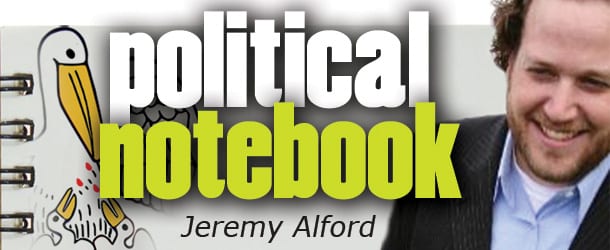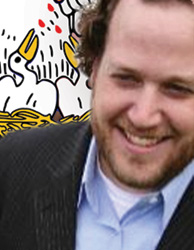By Jeremy Alford, Mitch Rabalais and Sarah Gamard
Candidates for governor and lieutenant governor should consider running for office together on an old-fashioned ticket, and next year’s incumbents should be watching their backs for a very particular reason, according to Lt. Gov. Billy Nungesser, who recently sat down for a taping of LaPolitics’ Capitol Gains talk show.
In the episode, Nungesser discusses his relationship with Gov. John Bel Edwards; explains why tourism dollars are becoming more difficult to secure from the government; and offers up a tiny history lesson on the Pentagon Barracks in Baton Rouge.
On the topic of elections, Nungesser predicted that more term-limited lawmakers than expected will ultimately run for other offices next year, rather than simply go home. “There’s fifty-plus people term-limited out,” said Nungesser. “There’ll be a lot of people in a lot of different races looking for a new spot to land. So I think everybody statewide, and a lot of parish and other local officials, will see a lot of competition that, before term limits, they would have stayed put. But now, they’re going to be moving around looking for a new opportunity.”
Like his predecessors, Nungesser said he’d love to expand the scope of responsibilities for the position in which he serves. But in order to accomplish anything meaningful, such as brokering economic development projects or tax incentives, he said, a sitting lieutenant governor would need the enthusiastic assistance of a sitting governor.
While Nungesser does comment on his relationship with Edwards, he was discussing statewide offices more broadly in this instance — and that’s when the lieutenant governor floated a novel and ancient idea.
“To get the most bang for your buck, you’ve got to have that good work relationship with the governor,” he said. “So maybe it’s time to talk about running as a ticket again.”
That’s a nod to the so-called olden days of Louisiana politics, when candidates for top offices would pool their resources, promote their shared tickets to voters and either win or lose as a team.
The Brothers Long — Huey and Earl — practiced this method, which played a visible role in Louisiana politics throughout most of the last century.
“For many years, since Jimmy Fitzmorris, the lieutenant governor and the governor didn’t always have the best relationship even though they were with the same party,” Nungesser said. “And that’s not good for Louisiana. You can’t do your job and not work with the rest of the statewide elected officials.”
So is Nungesser ready to run on a ticket in 2019? Not exactly, he replied laughing.
“But I think you’re probably going to see a ticket run — Republicans with Democrats,” he said, adding it was more of a guess than a distribution of insider information.
ACLU Monitoring Louisiana Officials
Bruce Hamilton, a staff attorney for the Louisiana chapter of the American Civil Liberties Union, told LaPolitics recently that of the dozen or so complaints that his organization has received this year about government officials supposedly “abusing” social media platforms, at least five involve Congressman Clay Higgins, R-Port Barre.
LaPolitics became aware that the ACLU was fielding complaints and monitoring the online activities of elected officials after a subscriber posted a related status update on his social media account.
When contacted, Hamilton declined to disclose the names of the other officials who have spurred complaints from Louisiana citizens, but said they range from a member of Congress to a parish public information officer. At least one complaint involves a citizen being blocked by an elected official; but what exactly the ACLU deems to be the nature of the abuse is unclear.
Hamilton said the ACLU sent a letter to Higgins Monday telling him about these complains and asking him to address them. Hamilton said they have yet to get a reply, and Higgins’ office said they don’t have a record of receiving the letter. The ACLU declined to share the letter with LaPolitics.
Political History: The Conspiracist Versus The Crooner
By 1973, Orleans Parish District Attorney Jim Garrison was a well-known figure outside of his jurisdiction, due largely to the legal and political rabbit hole he fell into in the wake of the assassination of President John F. Kennedy.
Trapped in the shadow of a trial gone bad, the notoriously tenacious former FBI agent was desperately fighting for his political life. Four years earlier, Garrison and his prosecutors had staged the sensational trial of Clay Shaw, a prominent New Orleans businessman, charging that he had been involved in the assassination.
The Louisiana-rooted case drew international press and attention, of course, bringing Garrison to such heights as Johnny Carson’s Tonight Show. As for Shaw, he was acquitted after less than an hour of jury deliberations.
Garrison himself was also on trial in 1973. Federal prosecutors accused him of taking bribes from operators of illegal pinball machines — and keeping them in business by directing the efforts of his office elsewhere.
When reporters questioned him at a press conference, Garrison shouted, “The Department of Justice of the U.S. government is absolutely corrupt!”
Garrison was eventually acquitted that August, after the validity of some evidence was called into question. The lengthy criminal trial had eaten up most of the district attorney’s year, and his re-election campaign would begin in earnest in just a few short weeks.
His opponent was Harry Connick, Sr., a former assistant U.S. Attorney who also moonlighted as a singer in the Crescent City. His son, Harry Connick, Jr., then an aspiring musician, performed at his father’s campaign events. The candidate struck a memorable tone as well, calling the six-foot-six Garrison a “moral midget.”
It was Connick’s second race against Garrison, having last lost at the polls in 1969. But in the four years since, the incumbent’s political stock had plummeted. Even after Garrison was acquitted of bribery charges, many still seriously questioned his ethics.
After outspending Garrison by a wide margin, Connick defeated him on election day by less than 2,500 votes. Dejected, Garrison filed suit against Connick, alleging that voter fraud was responsible for his electoral loss.
The lawsuit, like the petitioner, was defeated. Connick would hold the seat for another 30 years.
Political History: LBJ’s Feelings About Shreveport
When late U.S. Sen. Russell Long learned that the White House had killed an appropriations line item for a Shreveport post office that was his pet project, the Louisiana lawmaker picked up the phone and called his fellow Democrat, then-President Lyndon B. Johnson.
It was January, 1965, and Long was eager to bring new federal jobs and money into the north Louisiana city. Johnson was a president with a purpose, known for his domineering personality and brash political style. The men had been freshmen senators together; they were old friends; and they both knew that all politics were local.
The resulting exchange, secretly recorded by Johnson from the Oval Office, is now housed by the University of Virginia’s Miller Center.
After exchanging pleasantries, Long explained his predicament and Shreveport’s needs. The president, fresh off the largest electoral victory in American history and days away from his second inauguration, was not in a conciliatory mood.
Johnson stated clearly that the removal of the post office project was made out of political animosity. Despite winning 44 states the previous fall, he had lost Louisiana to Barry Goldwater by a wide margin. Caddo Parish, in particular, had been a hotbed of anti-Johnson sentiment — and somehow, some way, word had gotten back to Johnson and it stuck in his craw.
“Those are some of the meanest, most vicious people in the United States,” Johnson told Long during their phone call. “Now you help those folks that vote for you and stay with you. You don’t reward Shreveport.”
Long tried to reason with the president, saying, “I told those people I was going to get it for them.”
The president was undeterred. He would be happy to approve federal projects in Louisiana to help the senator politically, he told Long, but anything in Shreveport was out of the question.
When Long mentioned job losses at Barksdale Air Force Base, the commander-in-chief said he was considering shutting down the whole installation. Frustrated, Long started pleading before LBJ cut him off.
“I know your daddy must be turning over in his grave,” Johnson said, referring to former Gov. Huey P. Long and bringing the conversation to a close. “He didn’t reward people that way.”
They Said It
“I’m thinking, ‘Man, I must be dropping acid.’ Not that I’ve ever dropped acid. But … for the record, I have not.”
— U.S. Sen. Bill Cassidy of Baton Rouge, describing his reaction to committee testimony on C-SPAN
“I am what they call a radical centrist.”
— Former New Orleans Mayor Mitch Landrieu, describing his political philosophy on CNN
“Thank God.”
— Lafourche Parish Risk Manager Brent Abadie, after his parish council voted unanimously against appointing him to be parish finance director
“I got a glimpse of what hell looks like.”
— State Sen. Ronnie Johns, R-Lake Charles, on this year’s special sessions, quoted in The American Press.
For more Louisiana political news, visit www.LaPolitics.com or follow Jeremy Alford on Twitter @LaPoliticsNow.














Comments are closed.